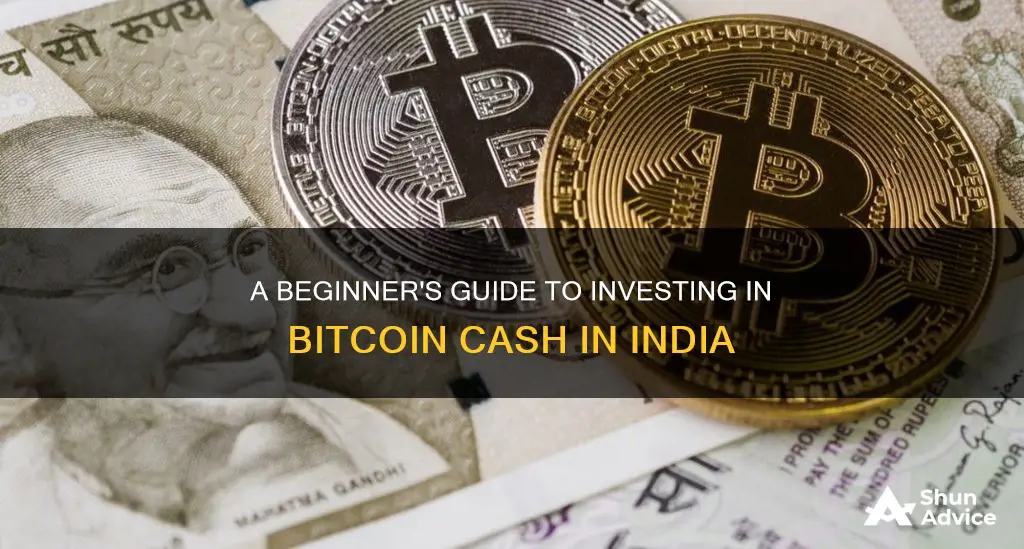
Bitcoin is a decentralised digital currency that has been in use since 2009. It is the first and most popular cryptocurrency or virtual currency in the world. In India, it is not considered legal tender, but it is also not illegal to hold or transact in Bitcoins. To invest in Bitcoin in India, you can use a crypto exchange platform or opt for a peer-to-peer transaction. Crypto exchanges such as CoinDCX, CoinSwitch, WazirX, and Mudrex are some of the popular choices in India. These platforms allow you to buy, sell, and hold Bitcoin and other cryptocurrencies. Before investing, you will need to complete a KYC process and provide documents such as your PAN card and address proof. It is important to note that investing in Bitcoin comes with risks due to its highly volatile nature.
| Characteristics | Values |
|---|---|
| How to invest in Bitcoin in India | Through a Crypto Exchange, P2P Transaction, or Bitcoin Mining |
| Minimum Investment | INR 100 |
| Legal Status | Not considered legal tender in India |
| Taxation | 30% on income from transfer of virtual digital assets |
| Best Crypto Exchanges in India | CoinDCX, CoinSwitch, WazirX, Mudrex, ZebPay |

Crypto exchange platforms
- CoinDCX: Recognised as one of the safest and most transparent crypto exchanges in India, with around 14 million registered users. It offers access to up to 500 cryptocurrencies and is known for its significant liquidity. CoinDCX also offers margin trading, staking, and lending options.
- CoinSwitch: With over 20 million registered users, this exchange is ideal for beginners. It offers trading in nearly 100 cryptocurrencies, with investments starting from as low as 100 INR. CoinSwitch provides an extensive range of educational resources and has a user-friendly interface.
- WazirX: A reliable and rapidly growing platform with around 15 million users. WazirX offers access to over 300 cryptocurrencies and is known for its user-friendly interface and advanced trading charts. It also runs a referral program that offers rewards of up to 50% on trades.
- Mudrex: A government-recognised platform with over 2 million users, offering investment opportunities in over 350 cryptocurrencies. Mudrex provides "Coin Sets," which are expert-curated, theme-based crypto baskets that offer diversification and reduced risk. It also has zero crypto deposit fees.
- ZebPay: A well-known platform with nearly 6 million users, ZebPay is ideal for intraday crypto trading and offers lightning-fast payments with lower maker fees. It provides fixed return options for lending cryptocurrencies, with interest rates ranging from 0.2% to 8.5%. ZebPay also has strong security measures, with 98% of coin storage in cold wallets.
- Bitbns: With over 40 lakh active users, Bitbns offers a wide range of educational resources and advanced trading features like margin trading. It was the first crypto exchange in India to offer tax relief to investors by introducing zero TDS on Systematic Investment Plans (SIPs).
- Unocoin: One of the oldest crypto exchanges in India, Unocoin has over 2 million registered users and offers trading in more than 100 digital currencies. It provides free Bitcoins on sign-up and a referral program that earns users 15% of transaction fees. Unocoin also facilitates crypto lending and has a "crypto basket" feature for diversifying portfolios.
- BuyUcoin: A popular platform among millennial users due to its simple user interface and features like free wallets, real-time spot trading, and lifetime commissions on referrals. BuyUcoin offers trading in more than 130 crypto pairs and has its own NFT marketplace.
- Giottus: A fast-growing exchange that offers fixed deposits, Systematic Investment Plans (SIPs), and the ability to create crypto baskets of themed coins. Giottus provides multilingual support and has high-end security measures, with regular security audits.
Dogecoin: Long-Term Investment or Just a Meme?
You may want to see also

Payment methods
After choosing a crypto exchange, you will need to fund your account before you can begin investing in Bitcoin. The payment methods available to you will depend on the exchange you choose, but they may include:
- Bank transfers
- Net banking
- Mobikwik
- Cryptocurrency wallet
- Unified Payments Interface (UPI)
- Credit or debit card
- Wire transfers
- PayPal
- Apple Pay
- Venmo
Different platforms will charge varying transaction fees for these payment methods. For example, CoinDCX, a popular crypto exchange in India, does not charge a fee for UPI and bank transfers, but it does charge 0.5% for net banking. WazirX, another Indian exchange, bases its trading fee on your trading volume in INR pairs over the last 30 days and your current WRX holdings.
Credit cards are not supported for wallet transfers on WazirX, and charges depend on the getaway you use. Generally, platforms tend to charge higher transaction fees for credit/debit card purchases and wire transfers. Therefore, it often makes more sense to use electronic transfers from a bank account.
Before choosing a payment method, it is worth checking the fees charged by the platform for each payment option.
A Beginner's Guide: Investing in Bitcoin with Luno
You may want to see also

Bitcoin wallets
Types of Bitcoin Wallets:
- Mobile Wallets: These are applications that can be installed on your mobile device, such as Trust Wallet, which is available for iOS and Android. Mobile wallets are convenient for face-to-face transactions and often utilise QR codes for quick and seamless transfers. However, they are susceptible to malware and the loss or damage of the device may result in the loss of funds.
- Desktop Wallets: Desktop wallets are installed on computers or laptops. They can offer hardware wallet support and operate as full nodes, but they are not designed for scanning QR codes. Desktop wallets are also vulnerable to malware and spyware.
- Hardware Wallets: Hardware wallets are physical devices that connect to your computer or mobile device when you need to manage your funds. They are considered one of the most secure ways to store large amounts of Bitcoin as they are offline and less susceptible to hacking.
Key Considerations When Choosing a Bitcoin Wallet:
- Security: Ensure the wallet has robust security features, such as two-factor authentication, encryption, and backup options.
- Ease of Use: Opt for a wallet with a user-friendly interface, especially if you are a beginner.
- Device Compatibility: Choose a wallet that is compatible with your operating system (iOS, Android, Windows, macOS, or Linux).
- Control: Some wallets give you full control over your Bitcoin, meaning no third party can freeze or take away your funds. However, this also comes with the responsibility of securing and backing up your wallet.
- Transaction Fees: Consider wallets that allow you to set the transaction fees paid to the Bitcoin network to ensure timely confirmations without overpaying.
- Customer Support: Look for wallets that provide comprehensive guides, tutorials, and support to help you understand Bitcoin and navigate the platform effectively.
Examples of Bitcoin Wallets:
- Trust Wallet: A self-custody crypto wallet that supports Bitcoin, Ethereum, Solana, Cardano, Bitcoin Cash, and more. It offers industry-leading security and multi-chain functionality.
- Bitcoin.com App: A digital wallet that enables you to buy, sell, trade, and invest in various cryptocurrencies, including Bitcoin, Bitcoin Cash, Ethereum, and ERC-20 tokens. It provides robust security features and allows you to create multiple wallets for privacy and customisation.
- CoinDCX: Recognised as one of the safest and most transparent crypto exchanges in India, with around 14 million registered users.
- CoinSwitch: One of the top cryptocurrency platforms in India, with over 20 million registered users. It is highly recommended for beginners, allowing investments starting from as low as 100 INR in Bitcoin.
- WazirX: A reliable and rapidly growing platform for cryptocurrency trading in India, with approximately 15 million users.
Strategizing Bitcoin Investments: Maximizing Returns
You may want to see also

Bitcoin mining
Bitcoin Cash (BCH) mining requires three things: a dedicated mining setup (rig) or a mining pool, a wallet for collecting the reward, and a robust infrastructure to host your mining operations.
Mining Setup
There are two main options for your mining setup: an application-specific integrated circuit (ASIC) or personal computer video cards, also known as a graphics processing unit (GPU).
ASIC mining rigs are off-the-shelf and consist of a series of processor chips, an ethernet connection, and a fan. They are easy to set up, as they just need the relevant IP address and mining pool information.
GPU configurations, on the other hand, take advantage of the processing power of the latest gaming graphics cards. In addition to the graphics card(s), a typical GPU setup also consists of a motherboard or computer processing unit (CPU), power supply, risers, and random access memory chips (RAM), all packed into a mining frame.
Mining Pool
Joining a mining pool allows you to participate in the ecosystem without the complexities of setting up your own operation. All you need is a working computer, an internet connection, and the necessary software. A pool increases your chances of solving a block faster than other miners by spreading computational tasks among multiple miners.
Wallet
You will need a wallet to collect your rewards. Miners often prefer cold wallets or hardware wallets that are run on USB sticks. Unlike online wallets, cold wallets are offline and protected from online attacks. They can only be accessed with a private key and complementary software.
Infrastructure
To host your mining operations, you will need a robust infrastructure with powerful computers. You will also need to consider the space you have available and your electricity costs.
Profitability
To determine whether your mining operations are profitable, you will need to calculate your overhead expenses (equipment, space, electricity, and manpower) and compare them to your expected profitability.
Halving
It is important to note that the Bitcoin Cash ecosystem is designed to lower the rate of rewards by half, depending on the number of coins that have been released through an event known as a rewards halving. The first BCH halving took place on April 8, 2020, and the next one is expected to cut the block reward to 3.125 BCH in March 2024.
The Ultimate Guide to Investing in Bitcoin Code
You may want to see also

Legal status
The legal status of Bitcoin in India has been ambiguous, with no specific legislation on its usage. However, in 2018, the Reserve Bank of India (RBI) restricted commercial banks from facilitating Bitcoin transactions. This move was challenged in the Supreme Court, which overturned the RBI's order in 2020, providing relief to crypto exchanges. It is important to note that holding or transacting in Bitcoins was never illegal in India.
In 2021, the Indian government expressed its intention to discontinue the use of Bitcoin and other virtual currencies for criminal purposes, with Finance Minister Arun Jaitley stating that India does not recognize them as legal tender. The government has also explored creating a state-backed digital currency, while potentially banning private ones like Bitcoin.
Despite the ambiguity, the Supreme Court of India specifically lifted the ban on cryptocurrency in 2020, and investing in cryptocurrency is considered legitimate. However, there is still uncertainty regarding the taxation of income from cryptocurrency and its regulatory regime.
The Indian Parliament is expected to pass a specific law to address the cryptocurrency market, with experts advocating for regulation rather than a complete ban due to the significant size of the market.
Liquid Chap's Bitcoin Investment: Worth the Risk?
You may want to see also
Frequently asked questions
Yes, it is legal to buy Bitcoin in India. However, it is not considered legal tender, and there are questions over the legal status of Bitcoin and other cryptocurrencies.
There is no fixed minimum amount required to buy Bitcoin. You can invest a sum as low as Rs 100 or purchase fractional shares, known as "Sats," which are 100,000,000th of a Bitcoin.
An ideal crypto exchange should be simple, flexible, and accessible. Look for an exchange with a user-friendly interface, robust security measures, and low fees. Ensure the exchange has a strict Know Your Customer (KYC) process to avoid illicit usage.
You can fund your account on a crypto exchange through various methods, including bank transfers, net banking, Mobikwik, a cryptocurrency wallet, or UPI. Different exchanges may support varying payment options, so check with your chosen platform.







